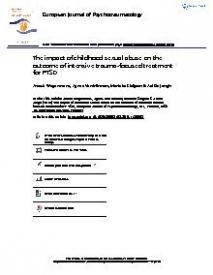The impact of childhood sexual abuse on the outcome of intensive trauma-focused treatment for PTSD
ABSTRACT
Background: It is assumed that PTSD patients with a history of childhood sexual abuse benefit less from trauma-focused treatment than those without such a history.
Objective: To test whether the presence of a history of childhood sexual abuse has a negative effect on the outcome of intensive trauma-focused PTSD treatment.
Method: PTSD patients, 83% of whom suffered from severe PTSD, took part in a therapy programme consisting of 2 × 4 consecutive days of Prolonged Exposure (PE) and EMDR therapy (eight of each). In between sessions, patients participated in sport activities and psycho-education sessions. No prior stabilization phase was implemented. PTSD symptom scores of clinician-administered and self-administered measures were analysed using the data of 165 consecutive patients. Pre-post differences were compared between four trauma groups; patients with a history of childhood sexual abuse before age 12 (CSA), adolescent sexual abuse (ASA; i.e. sexual abuse between 12 and 18 years of age), sexual abuse (SA) at age 18 and over, or no history of sexual abuse (NSA).
Results: Large effect sizes were achieved for PTSD symptom reduction for all trauma groups (Cohen’s d = 1.52–2.09). For the Clinical Administered PTSD Scale (CAPS) and the Impact of Event Scale (IES), no differences in treatment outcome were found between the trauma (age) groups. For the PTSD Symptom Scale Self Report (PSS-SR), there were no differences except for one small effect between CSA and NSA.
Conclusions: The results do not support the hypothesis that the presence of a history of childhood sexual abuse has a detrimental impact on the outcome of first-line (intensive) trauma-focused treatments for PTSD.
In: European Journal of Psychotraumatology, ISSN 2000-8198 ; eISSN 2000-8066 | 9 | 1 | 1430962
https://doi.org/10.1080/20008198.2018.1430962


